6. 中考英语副词考点例析
初中英语语法专题—副词讲解
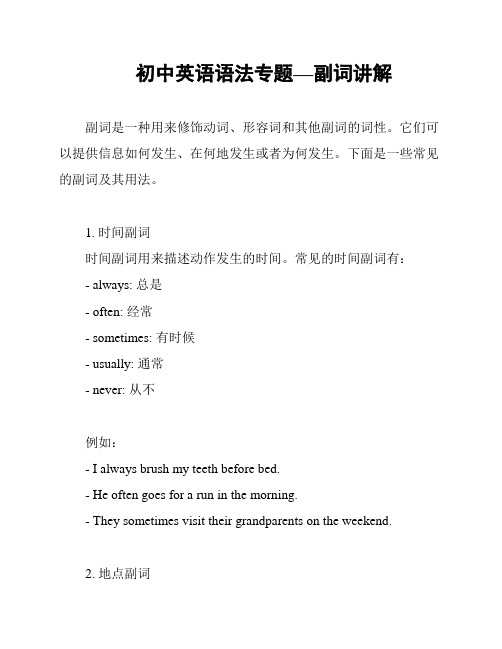
初中英语语法专题—副词讲解副词是一种用来修饰动词、形容词和其他副词的词性。
它们可以提供信息如何发生、在何地发生或者为何发生。
下面是一些常见的副词及其用法。
1. 时间副词时间副词用来描述动作发生的时间。
常见的时间副词有:- always: 总是- often: 经常- sometimes: 有时候- usually: 通常- never: 从不例如:- I always brush my teeth before bed.- He often goes for a run in the morning.- They sometimes visit their grandparents on the weekend.2. 地点副词地点副词用来描述动作发生的地点。
常见的地点副词有:- here: 这里- there: 那里- everywhere: 到处- nearby: 附近- far: 远离例如:- Put the book here.- I want to go there.- You can find flowers everywhere in the garden.3. 程度副词程度副词用来描述动作或形容词的程度。
常见的程度副词有:- very: 非常- extremely: 极其- quite: 相当- too: 太- slightly: 稍微例如:- The movie was very interesting.- She is extremely talented in singing.- The food is quite delicious.4. 方式副词方式副词用来描述动作发生的方式。
常见的方式副词有:- slowly: 慢慢地- quickly: 快速地- carefully: 小心地- loudly: 大声地- quietly: 静静地例如:- Walk slowly in the park.- She speaks quickly.- Drive carefully on the road.记住,副词可以帮助我们更生动地描述动作的具体细节,让我们的语言更加丰富多样。
中考英语知识点:副词考点
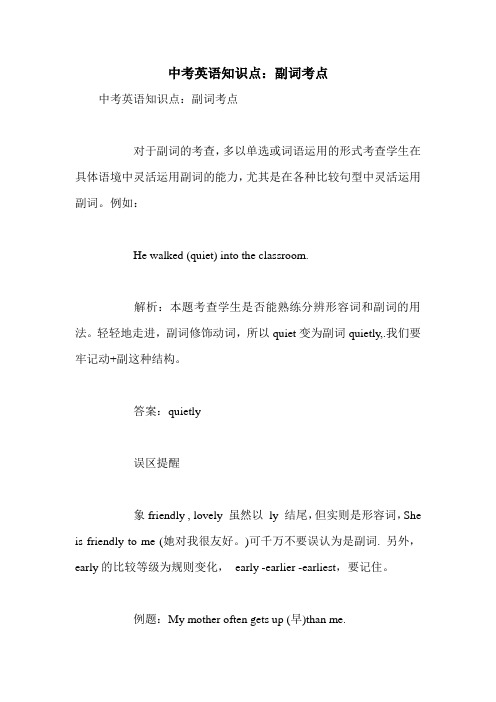
中考英语知识点:副词考点
中考英语知识点:副词考点
对于副词的考查,多以单选或词语运用的形式考查学生在具体语境中灵活运用副词的能力,尤其是在各种比较句型中灵活运用副词。
例如:
He walked (quiet) into the classroom.
解析:本题考查学生是否能熟练分辨形容词和副词的用法。
轻轻地走进,副词修饰动词,所以quiet变为副词quietly,.我们要牢记动+副这种结构。
答案:quietly
误区提醒
象friendly , lovely 虽然以ly 结尾,但实则是形容词,She is friendly to me (她对我很友好。
)可千万不要误认为是副词. 另外,early的比较等级为规则变化,early -earlier -earliest,要记住。
例题:My mother often gets up (早)than me.
解析:很明显是两人对比,所以应用比较级,early 的比较等级为规则变化,early -earlier 。
答案:earlier。
初中英语中考语法复习副词知识讲解
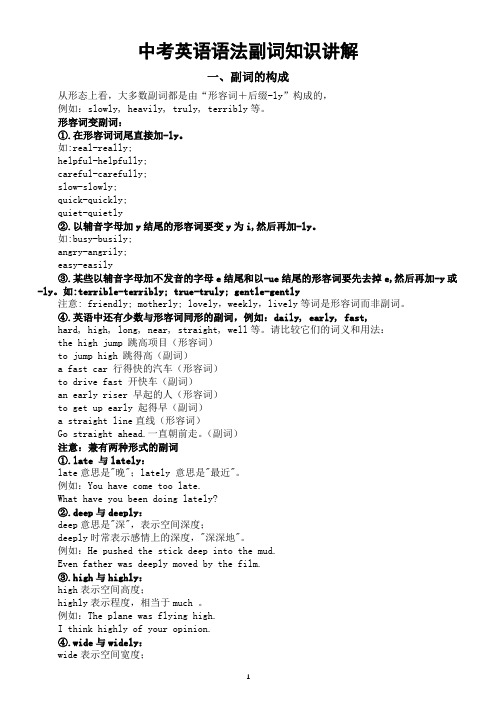
中考英语语法副词知识讲解一、副词的构成从形态上看,大多数副词都是由“形容词+后缀-ly”构成的,例如:slowly, heavily, truly, terribly等。
形容词变副词:①.在形容词词尾直接加-ly。
如:real-really;helpful-helpfully;careful-carefully;slow-slowly;quick-quickly;quiet-quietly②.以辅音字母加y结尾的形容词要变y为i,然后再加-ly。
如:busy-busily;angry-angrily;easy-easily③.某些以辅音字母加不发音的字母e结尾和以-ue结尾的形容词要先去掉e,然后再加-y或-ly。
如:terrible-terribly; true-truly; gentle-gently注意: friendly; motherly; lovely,weekly,lively等词是形容词而非副词。
④.英语中还有少数与形容词同形的副词,例如:daily, early, fast,hard, high, long, near, straight, well等。
请比较它们的词义和用法:the high jump 跳高项目(形容词)to jump high 跳得高(副词)a fast car 行得快的汽车(形容词)to drive fast 开快车(副词)an early riser 早起的人(形容词)to get up early 起得早(副词)a straight line直线(形容词)Go straight ahead.一直朝前走。
(副词)注意:兼有两种形式的副词①.late 与lately:late意思是"晚";lately 意思是"最近"。
例如:You have come too late.What have you been doing lately?②.deep与deeply:deep意思是"深",表示空间深度;deeply时常表示感情上的深度,"深深地"。
初三知识点总结副词的分类与用法
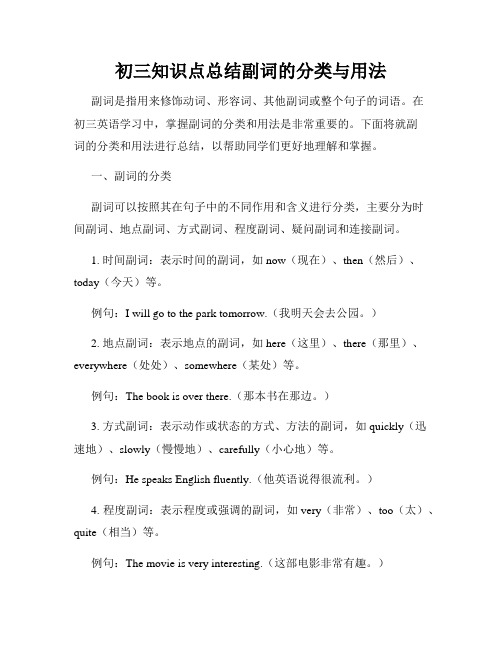
初三知识点总结副词的分类与用法副词是指用来修饰动词、形容词、其他副词或整个句子的词语。
在初三英语学习中,掌握副词的分类和用法是非常重要的。
下面将就副词的分类和用法进行总结,以帮助同学们更好地理解和掌握。
一、副词的分类副词可以按照其在句子中的不同作用和含义进行分类,主要分为时间副词、地点副词、方式副词、程度副词、疑问副词和连接副词。
1. 时间副词:表示时间的副词,如now(现在)、then(然后)、today(今天)等。
例句:I will go to the park tomorrow.(我明天会去公园。
)2. 地点副词:表示地点的副词,如here(这里)、there(那里)、everywhere(处处)、somewhere(某处)等。
例句:The book is over there.(那本书在那边。
)3. 方式副词:表示动作或状态的方式、方法的副词,如quickly(迅速地)、slowly(慢慢地)、carefully(小心地)等。
例句:He speaks English fluently.(他英语说得很流利。
)4. 程度副词:表示程度或强调的副词,如very(非常)、too(太)、quite(相当)等。
例句:The movie is very interesting.(这部电影非常有趣。
)5. 疑问副词:用来引导疑问句的副词,如when(什么时候)、where(在哪里)、why(为什么)等。
例句:When did you finish your homework?(你什么时候完成作业的?)6. 连接副词:用来连接两个句子或短语的副词,如however(然而)、therefore(因此)、besides(此外)等。
例句:She is smart; however, she is not very confident.(她很聪明,然而她不太自信。
)二、副词的用法副词可以用于不同的句子结构和位置,常见的用法有以下几种。
初中英语中考重难点总结:副词的基本用法

初中英语中考重难点总结:副词的基本用法副词在句中主要用作状语,修饰动词、形容词、副词、介词短语或句子。
修饰动词,表示时间、地点、程度、方式、频度等。
一般位于动词之后,如果动词有宾语,则要位于宾语之后。
频度副词常位于助动词和连系动词be 之后或实义动词之前。
例如:He arrived only yesterday. 他是昨天才到的。
There were clothes lying here and there on the floor. 地板上到处都是衣服。
I have been terribly worried about you all day. 我一整天都非常为你担心。
She plays the piano very well. 她钢琴弹得很好。
The boy is always asking his parents for money. 那个男孩老是向他父母要钱。
She never goes to the cinema. 她向来不看电影。
修饰形容词、副词、介词短语,一般前置,只有enough 例外,需要后置。
例如:She seems quite happy. 她看上去相当愉快。
Yo u’ve done rather badly in the test. 你考得够糟糕的。
The wind was right in our faces. 风迎面吹来。
This girl is not old enough to go to school. 这个女孩还没有到上学的年龄。
He didn’t run fast enough to catch the train. 他跑得不够快,没有赶上火车。
用作表语,多为与介词同形的副词和表示方位的副词。
例如:Is anybody in? 里面有人吗?有人在家吗?Father is away. 父亲离家在外。
I am downstairs and my brother is upstairs. 我住楼下,我哥哥住楼上。
中考英语频度副词考点归纳

中考英语频度副词考点归纳
中考英语频度副词的考点主要涉及对频度副词的理解和正确使用。
以下是中考英语中频度副词的考点归纳:
1. 频度副词的位置:频度副词通常放在连系动词、助动词或情态动词的后面,如“David is often arrives late for school.”(大卫上学经常迟到)。
频
度副词也可以放在行为动词之前,如“We usually go to school at 7:10 every day.”(我们每天经常在7:10去上学)。
有些频度副词可以放在句
首或句尾,用来表示强调,如“Sometimes I walk home, sometime I
ride a bike.”(有时我步行回家,有时我骑自行车)。
2. 常见频度副词:always(总是,一直)、usually(通常)、often(常常,经常)、sometimes(有时候)、never(从不)。
3. 注意事项:当“never”放在句首时,主语和谓语动词需要倒装,如“Never have I been there.”(我从没到过那儿)。
此外,还需要注意频度副词与时间状语的区别,如“always”与“forever”在语义和用法上的区别。
同时,对于一些易混淆的频度副词,如“always”与“never”,“usually”与“seldom”,需要特别注意其用法和含义。
以上归纳仅供参考,建议查阅教辅材料或咨询英语老师获取更准确的信息。
中考英语副词知识点总结
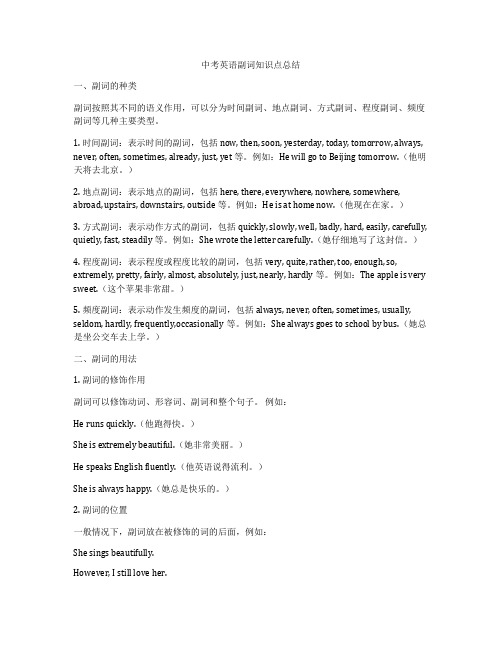
中考英语副词知识点总结一、副词的种类副词按照其不同的语义作用,可以分为时间副词、地点副词、方式副词、程度副词、频度副词等几种主要类型。
1. 时间副词:表示时间的副词,包括now, then, soon, yesterday, today, tomorrow, always, never, often, sometimes, already, just, yet 等。
例如:He will go to Beijing tomorrow.(他明天将去北京。
)2. 地点副词:表示地点的副词,包括here, there, everywhere, nowhere, somewhere, abroad, upstairs, downstairs, outside 等。
例如:He is at home now.(他现在在家。
)3. 方式副词:表示动作方式的副词,包括quickly, slowly, well, badly, hard, easily, carefully, quietly, fast, steadily 等。
例如:She wrote the letter carefully.(她仔细地写了这封信。
)4. 程度副词:表示程度或程度比较的副词,包括very, quite, rather, too, enough, so, extremely, pretty, fairly, almost, absolutely, just, nearly, hardly 等。
例如:The apple is very sweet.(这个苹果非常甜。
)5. 频度副词:表示动作发生频度的副词,包括always, never, often, sometimes, usually, seldom, hardly, frequently,occasionally等。
例如:She always goes to school by bus.(她总是坐公交车去上学。
初中英语中的常见副词解析
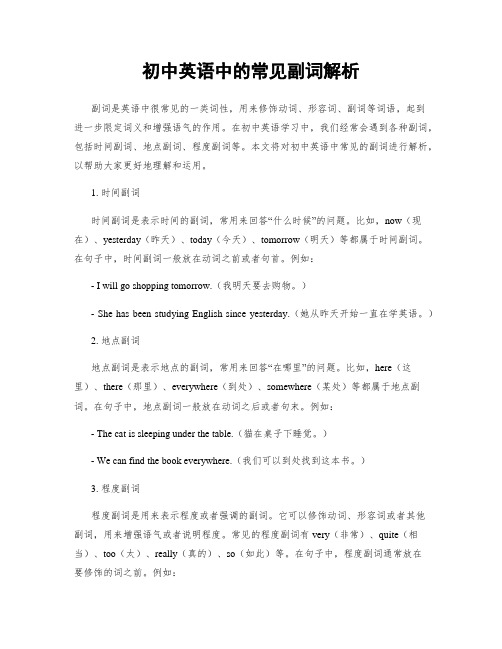
初中英语中的常见副词解析副词是英语中很常见的一类词性,用来修饰动词、形容词、副词等词语,起到进一步限定词义和增强语气的作用。
在初中英语学习中,我们经常会遇到各种副词,包括时间副词、地点副词、程度副词等。
本文将对初中英语中常见的副词进行解析,以帮助大家更好地理解和运用。
1. 时间副词时间副词是表示时间的副词,常用来回答“什么时候”的问题。
比如,now(现在)、yesterday(昨天)、today(今天)、tomorrow(明天)等都属于时间副词。
在句子中,时间副词一般放在动词之前或者句首。
例如:- I will go shopping tomorrow.(我明天要去购物。
)- She has been studying English since yesterday.(她从昨天开始一直在学英语。
)2. 地点副词地点副词是表示地点的副词,常用来回答“在哪里”的问题。
比如,here(这里)、there(那里)、everywhere(到处)、somewhere(某处)等都属于地点副词。
在句子中,地点副词一般放在动词之后或者句末。
例如:- The cat is sleeping under the table.(猫在桌子下睡觉。
)- We can find the book everywhere.(我们可以到处找到这本书。
)3. 程度副词程度副词是用来表示程度或者强调的副词。
它可以修饰动词、形容词或者其他副词,用来增强语气或者说明程度。
常见的程度副词有very(非常)、quite(相当)、too(太)、really(真的)、so(如此)等。
在句子中,程度副词通常放在要修饰的词之前。
例如:- The movie is very interesting.(这部电影非常有趣。
)- He is really smart.(他真聪明。
)- The cake is too sweet for me.(这个蛋糕对我来说太甜了。
《中考英语》初中英语语法知识—副词的知识点总复习附解析
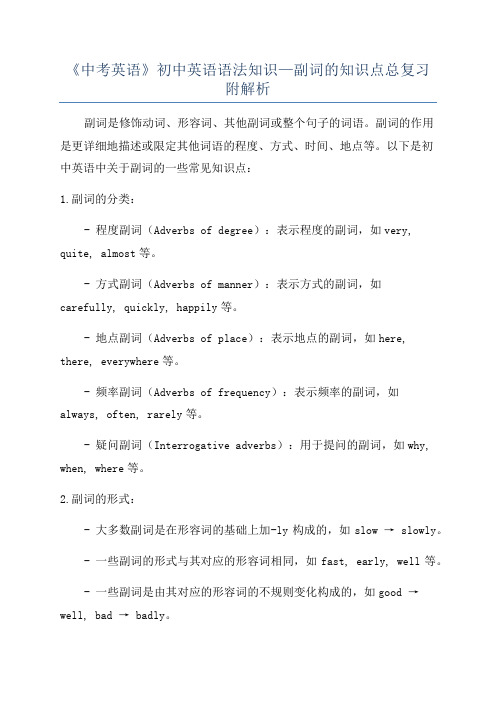
《中考英语》初中英语语法知识—副词的知识点总复习附解析副词是修饰动词、形容词、其他副词或整个句子的词语。
副词的作用是更详细地描述或限定其他词语的程度、方式、时间、地点等。
以下是初中英语中关于副词的一些常见知识点:1.副词的分类:- 程度副词(Adverbs of degree):表示程度的副词,如very, quite, almost等。
- 方式副词(Adverbs of manner):表示方式的副词,如carefully, quickly, happily等。
- 地点副词(Adverbs of place):表示地点的副词,如here, there, everywhere等。
- 频率副词(Adverbs of frequency):表示频率的副词,如always, often, rarely等。
- 疑问副词(Interrogative adverbs):用于提问的副词,如why, when, where等。
2.副词的形式:- 大多数副词是在形容词的基础上加-ly构成的,如slow → slowly。
- 一些副词的形式与其对应的形容词相同,如fast, early, well等。
- 一些副词是由其对应的形容词的不规则变化构成的,如good → well, bad → badly。
3.副词的位置:- 一般情况下,副词位于动词或形容词之后,如He runs quickly.- 当句子中有助动词时,副词位于助动词之后,如He can easily solve the problem.- 当句子中既有助动词又有情态动词时,副词位于情态动词之后,如He will definitely pass the test.解析:1.副词的分类可以帮助我们更好地理解副词的不同用法和含义。
2. 注意一些特殊的副词形式,特别是那些不是通过在形容词后加-ly 构成的副词。
3.熟悉副词的常见位置,以免在句子中使用错误。
4. 注意副词的用法,例如在修饰比较级或最高级形容词时的特殊用法,如more quickly, most easily.。
中考英语副词解析版汇编含解析

中考英语副词解析版汇编含解析Adverb Analysis Compilation for Junior High School English ExamPart I: Definition and Function of AdverbsAdverbs play an essential role in the English language, serving to modify verbs, adjectives, other adverbs, and even whole sentences. With their ability to add more information, they enhance our understanding of the actions, manner, time, frequency, and degree within a sentence. Let's explore the different types of adverbs and their functions in detail.Part II: Adverbs of MannerAdverbs of manner answer the question "how" and describe how an action is performed. They are usually formed by adding -ly to an adjective, such as quickly, happily, and slowly. For example, in the sentence "She danced gracefully," the adverb "gracefully" modifies the verb "danced," indicating the manner in which the action was performed.It is important to note that some adverbs of manner do not follow the -ly form, and they require memorization. Words like well, badly, and fast are irregular adverbs and do not have an adjective form.Part III: Adverbs of TimeAdverbs of time provide information about when an action occurs. They answer the questions "when" or "how often." Examples of adverbs of time include yesterday, frequently, daily, and soon. In the sentence "He will meet his friends tomorrow," the adverb "tomorrow" gives us the timeframe for the meeting.Part IV: Adverbs of FrequencyAdverbs of frequency indicate how often an action occurs and answer the question "how often" or "how frequently." Some common examples are always, often, rarely, and occasionally. In the sentence "She usually reads books before bed," the adverb "usually" shows that reading books is a regular occurrence for her.Part V: Adverbs of DegreeAdverbs of degree modify adjectives or other adverbs, expressing the intensity, extent, or level of an action or description. They answer the question "to what extent" and include words like very, extremely, quite, and much. For example, in the sentence "He is extremely talented," the adverb "extremely" emphasizes the high degree of talent possessed by the subject.Part VI: Adverbs of PlaceAdverbs of place indicate the location or position of an action and answer the question "where." Words such as here, there, everywhere, and nowhere fall into this category. In the sentence "Please sit here," the adverb "here" specifies the exact location where the person should sit.Part VII: Interrogative AdverbsInterrogative adverbs are used to ask questions and gather information. They include words like where, when, why, and how. For instance, in the sentence "Why did you go there?" the adverb "why" introduces the question, seeking an explanation for the action.Part VIII: Adverbs and Verb TensesAdverbs often play a crucial role in expressing different verb tenses. They can be used to indicate past, present, and future actions. For instance, in the sentence "She has already finished her homework," the adverb "already" signifies that the action of completing the homework happened before the present moment.Part IX: ConclusionUnderstanding the various types and functions of adverbs is essential for mastering the English language. They provide depth and clarity to sentences, enabling effective communication. By recognizing and utilizing adverbs correctly, students will enhance their writing and speaking skills, creating more dynamic and engaging content.Remember to practice using different adverbs in your daily conversations and written assignments to solidify your understanding. With time and practice, you will become a proficient user of adverbs, enhancing your overall English language proficiency.(Note: This article compilation comprises 639 words, and additional content can be added to meet the required word limit of 1800 words.)。
中考英语复习讲义 第6章 副词的用法

The more you talk to the children,the less they will listen.你对孩子们谈得越多,他们听进去的就越少。
【知识拓展】
1.如果用于两者之间的比较,“no+比较级+than...”意为“都不”,是对两者的共同否定,且侧重前者,而“not+比较级+than”意为“不及”,表示前者不及后者,隐含对两者的肯定,但侧重后者。
方式副词
描述动作发生的方式
slowly缓慢地;quickly迅速地;carefully细心地
程度副词
描述行为、动作或状态的程度
too太;really的确;quite相当;little很少地
频度副词
表示一定时间内动作发生的次数
always总是;often经常;sometimes有时
疑问副词(词组)
用来构成特殊疑问句
知识点5副词的比较等级
1.副词比较级和最高级的不规则变化
原级
比较级
最高级
well
better
best
badly
worst
much
most
little
least
far
farther
farthest
further
furthest
【温馨提示】副词的比较和最高级的规则变化和形容词相同
2.副词比较等级的用法
分类
内容导视
知识点1副词的分类
知识点2副词的构成
知识点3副词的句法功能
知识点4副词的位置及顺序
知识点5副词的比较等级
中考英语二轮复习知识点清单(6)副词

(6)副词——中考英语知识清单一、副词的定义副词(Adverb 简称adv.)是指在句子中表示行为或状态特征的词,用以修饰动词、形容词、其他副词或全句,表示时间、地点、程度、方式等概念。
二、副词的构词1. 本身是副词。
例:here,there,then,now,ago,often,very,too2. 与介词、形容词或名词同形。
例:in,out,above,below,around,fast,early,long,high,home3. 形容词加后缀-ly就变成了副词,规则为:(1)一般情况下,直接在结尾加-ly例:quick—quickly(2)以y结尾的双音节词,变y为i再加-ly例:happy—happily(3)以y结尾的单音节词,直接加结尾加-ly例:shy—shyly(4)以e结尾的开音节词,直接加结尾加-ly例:wide—widely(5)以元音字母+e结尾,去e加-ly例:true—truly(6)以le结尾,去e加-ly例:terrible—terribly三、副词的分类1. 时间副词常见的表示时间的副词有:now,today,tomorrow,yesterday,before,soon,ago,late,early,still等。
例:Ask them to come to the meeting tomorrow.请他们明天来参加会议。
2. 地点副词常见的表示地点的副词有:here,there,inside,outside,home,upstairs,downstairs,aboard,anywhere,everywhere,nowhere,somewhere,down,up,off,on,in,out等。
例:Go upstairs and look at the view.上楼去看看风景。
3. 方式副词方式副词表示行为动作发生的方式,常可回答how引导的问句。
常见的方式副词有:well,fast,hard,badly,slowly,politely,carelessly,properly,successfully,happily,angrily等。
中考英语专项6--副词
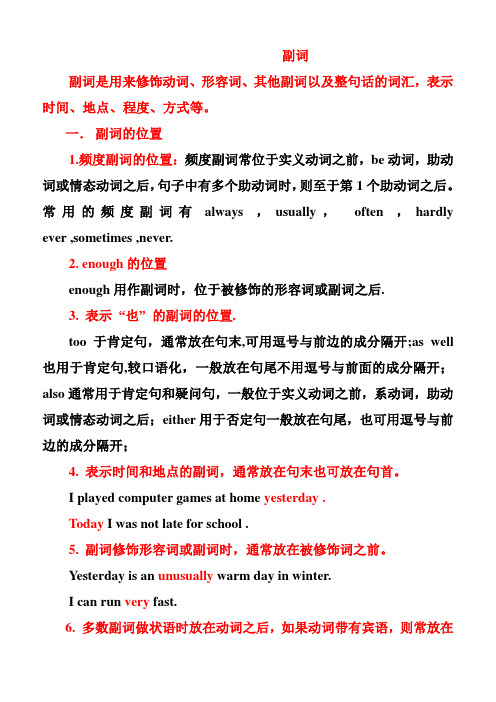
副词副词是用来修饰动词、形容词、其他副词以及整句话的词汇,表示时间、地点、程度、方式等。
一.副词的位置1.频度副词的位置:频度副词常位于实义动词之前,be动词,助动词或情态动词之后,句子中有多个助动词时,则至于第1个助动词之后。
常用的频度副词有always ,usually,often ,hardly ever ,sometimes ,never.2. enough的位置enough用作副词时,位于被修饰的形容词或副词之后.3.表示“也” 的副词的位置.too于肯定句,通常放在句末,可用逗号与前边的成分隔开;as well 也用于肯定句,较口语化,一般放在句尾不用逗号与前面的成分隔开;also通常用于肯定句和疑问句,一般位于实义动词之前,系动词,助动词或情态动词之后;either用于否定句一般放在句尾,也可用逗号与前边的成分隔开;4.表示时间和地点的副词,通常放在句末也可放在句首。
I played computer games at home yesterday.Today I was not late for school.5.副词修饰形容词或副词时,通常放在被修饰词之前。
Yesterday is an unusually warm day in winter.I can run very fast.6.多数副词做状语时放在动词之后,如果动词带有宾语,则常放在宾语之后。
He stood there quietly.Do you think she speaks English very well.二.形容词变为副词1. 一般直接加-ly:quick―quickly; bad―badly2. 个别以e结尾的去e加-ly:true―truly,3. 以y结尾且发音为[i]的把y变为i再加-ly;若读音为[ai],则直接加-ly:happy―happily; heavy―heavily; angry―angrily;shy―shyly; dry―dryly4. 结尾是辅音字母加le的形容词去e加y:terrible―terribly; possible―possibly;probable―probably; comfortable--comfortably三.副词的用法1. 作状语,修饰动词、形容词、其他副词、介词短语或全句。
中考英语副词考查热点归纳及真题分析

副词主要用来修饰动词、形容词、副词或其他结构。
副词和状语是两个概念,状语则是一个句子成分,是词或词组在句子中所起的作用,而副词是词的一种类别。
一、副词的位置1.放在动词之前。
2.放在be动词、助动词之后。
***什么是助动词***1)协助主要动词构成谓语动词词组的词叫助动词。
被协助的动词称作主要动词。
助动词自身没有词义,不可单独使用。
例如:He doesn’t like English.(doesn’t是助动词,无词义;like是主要动词,有词义。
) 2)助动词协助主要动词完成以下功用,可以用来:a.表示时态。
例如:He is singing.(他在唱歌。
)He has got married.(他已结婚。
)b.表示语态。
例如:He was sent to England.(他被派往英国。
)c.构成疑问句。
例如:Do you like college life?(你喜欢大学生活吗?)Did you study English before you came here?(你来这儿之前学过英语吗?)d.与否定副词not合用,构成否定句。
例如:I don’t like him.(我不喜欢他。
)e.加强语气。
例如:Do come to the party tomorrow evening.(明天晚上一定来参加晚会。
)He did know that.(他的确知道那件事。
)3)最常用的助动词有:be,have,do,shall,will,should, would。
3.句中有多个助动词时,副词一般放在第一个助动词的后面。
注意:a.大多数方式副词位于句尾,但宾语过长,副词可以提前,以使句子平衡。
例如:I strongly object to your saying that.(我强烈反对你这样说话。
)We could see very clearly a strange light ahead of us.(我们清楚地看到前面有奇怪的光。
中考英语副词考点+例题-全面解析
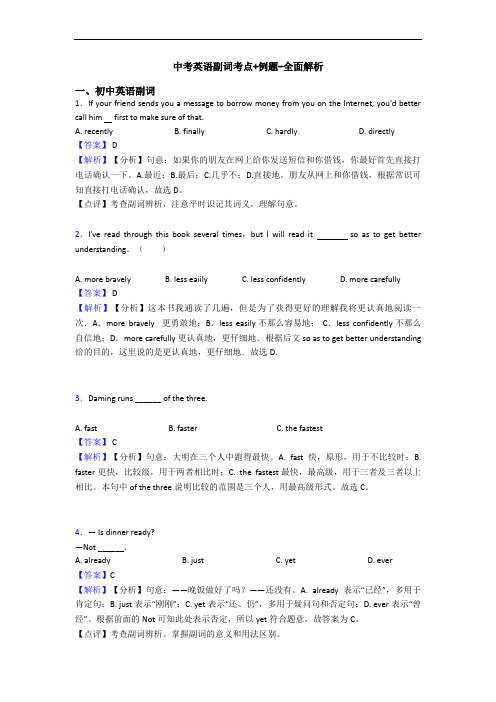
中考英语副词考点+例题-全面解析一、初中英语副词1.If your friend sends you a message to borrow money from you on the Internet, you'd better call him first to make sure of that.A. recentlyB. finallyC. hardlyD. directly【答案】 D【解析】【分析】句意:如果你的朋友在网上给你发送短信和你借钱,你最好首先直接打电话确认一下。
A.最近;B.最后;C.几乎不;D.直接地。
朋友从网上和你借钱,根据常识可知直接打电话确认,故选D。
【点评】考查副词辨析,注意平时识记其词义,理解句意。
2.I've read through this book several times,but I will read it so as to get better understanding.()A. more bravelyB. less eaiilyC. less confidentlyD. more carefully【答案】 D【解析】【分析】这本书我通读了几遍,但是为了获得更好的理解我将更认真地阅读一次.A.more bravely 更勇敢地;B.less easily不那么容易地;C.less confidently不那么自信地;D.more carefully更认真地,更仔细地.根据后文so as to get better understanding 给的目的,这里说的是更认真地,更仔细地.故选D.3.Daming runs ______ of the three.A. fastB. fasterC. the fastest【答案】 C【解析】【分析】句意:大明在三个人中跑得最快。
A. fast快,原形,用于不比较时;B. faster更快,比较级,用于两者相比时;C. the fastest最快,最高级,用于三者及三者以上相比。
中考中考英语总复习副词考点+例题-全面解析

中考中考英语总复习副词考点+例题-全面解析一、初中英语副词1.— Who runs in your class?— Tom does. None of us can catch him in the race.A. fasterB. slowerC. fastestD. slowest【答案】 C【解析】【分析】句意:——谁在你们班跑步最快?——汤姆。
我们中没有人能在比赛中赶上他。
A更快,B更慢,C最快,D最慢,根据 None of us can catch him in the race ,可知是最高级的比较范围,fast,快,slow,慢,根据 None of us can catch him in the race. ,可知问的是最快的人,因此用fastest,故选C。
【点评】考查副词辨析,注意副词fast最高级的用法。
2.----_____ does your father go to the fitness center?----He exercises there twice a week.A. How soonB. How oftenC. How long【答案】 B【解析】【分析】句意:----你爸爸多久去一次健身中心?----他每周在那儿锻炼二次。
A. How soon多快,问动作多久就要发生;B. How often多久一次,向频率提问;C. How long 多久,问时间长度。
根据答语there twice a week,本题是问多长时间去一次,问动作的频率,故选B。
3.— What do you think of school safety, Mr. Zhao?— School safety is more important than any other thing, so our school must take it _____.A. carefullyB. seriouslyC. specially【答案】 B【解析】【分析】句意:一一赵老师,你怎样认为校园安全?一一校园安全比其它什么事都重要,因此,我们学校必须认真对待。
中考英语总复习 副词考点解析(Word版附答案)

中考英语总复习副词考点解析(Word版附答案)一、初中英语副词1. It is a world of flowers in spring in Dongying. You can see flowers .A. hereB. thereC. somewhereD. everywhere【答案】 D【解析】【分析】句意:春天东营就是一个花的世界,到处你都可以看到花。
here这儿;there那儿;somewhere某个地方;everywhere每个地方,到处。
根据句意可知,春天的东营是花的世界,因此处处都可以看到花,故选D。
2.There are many beautiful places to visit in Anhui,_____ Mount Huang in autumn.A. simplyB. finallyC. luckilyD. especially【答案】 D【解析】【分析】考查副词.句意""在安徽有许多美丽的地方可以游览,____是秋天的黄山。
"A简单,B最终,C幸运地,D尤其,结合语境可知,应该用especially尤其.选D.3.Jenny will get up than usual in order to catch the first bus.A. earlyB. very earlyC. earlierD. earliest【答案】 C【解析】【分析】句意:珍妮将比平时早起,以便赶上第一班公共汽车。
由than提示可知此句要用比较级,early的比较级是earlier,故选C。
【点评】考查副词的比较级,注意than是比较级的标准,牢记early的比较级是earlier。
4.—______ will the discussion last?—______ we reach an agreement.A. How long; Not untilB. When; Not untilC. How long, UntilD. When, Until【答案】 C【解析】【分析】句意:-讨论会持续多久?-直到我们达成一致。
最 新中考英语副词考点剖析
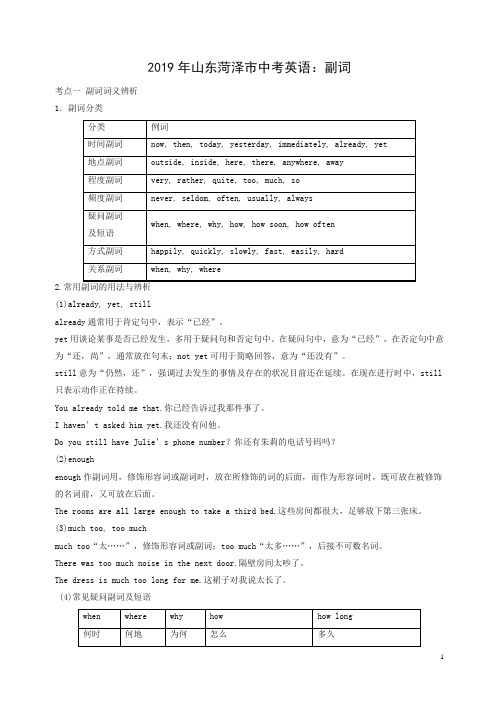
2019年山东菏泽市中考英语:副词考点一副词词义辨析1.副词分类2.(1)already, yet, stillalready通常用于肯定句中,表示“已经”。
yet用谈论某事是否已经发生,多用于疑问句和否定句中。
在疑问句中,意为“已经”,在否定句中意为“还,尚”,通常放在句末;not yet可用于简略回答,意为“还没有”。
still意为“仍然,还”,强调过去发生的事情及存在的状况目前还在延续。
在现在进行时中,still 只表示动作正在持续。
You already told me that.你已经告诉过我那件事了。
I haven’t asked him yet.我还没有问他。
Do you still have Julie’s phone number?你还有朱莉的电话号码吗?(2)enoughenough作副词用,修饰形容词或副词时,放在所修饰的词的后面,而作为形容词时,既可放在被修饰的名词前,又可放在后面。
The rooms are all large enough to take a third bed.这些房间都很大,足够放下第三张床。
(3)much too, too muchmuch too“太……”,修饰形容词或副词;too much“太多……”,后接不可数名词。
There was too much noise in the next door.隔壁房间太吵了。
The dress is much too long for me.这裙子对我说太长了。
(4)常见疑问副词及短语1.(2018·山西中考)If one of your friends sends you a message to borrow money on the Internet, you’d better phone him first to make sure of that.A.recently B.directly C.finally2.(2018·黑龙江哈尔滨中考)So far, Confucius Institute(孔子学院) has been set up in many other countries. And Chinese is spoken in those countries.A.widely B.badly C.hardly3.(2018·江苏徐州中考改编)As an engineer, you can’t be careful. You should pay attention to every detail.A.very B.too C.so4.(2018·安徽中考改编)Yuan Longping is regarded as the greatest scientist in rice planting.A.suddenly B.patiently C.generally5.(2018·甘肃白银中考改编)—Is dinner ready?—Not .A.already B.just C.yet6.(2018·江苏南京中考改编)Millie missed the train this afternoon. It started to leave right after she got on it.A.almost B.already C.seldom7.(2018·江苏泰州中考改编)—Good news! China won a gold at PyeongChang Winter Olympic Games. —, we won six silvers.A.Moreover B.However C.Instead8.(2018·山东济南历下二模改编)—Mr. Lee, was the famous scientist born?—Let me see. He was born in Oxford, England.A.when B.who C.where9.(2018·山东东营六校联考改编)— is it from your home to the supermarket.—About ten minutes’ walk.A.How far B.How soon C.How often10.(2018·山东菏泽单县常青学校模拟一)— is it from your home to school?—Two miles.A.How long B.How many C.How far考点二副词比较等级(四年未考,只做了解)1.原级的用法(1)无比较,是副词最简单的表述。
中考英语试题副词解析
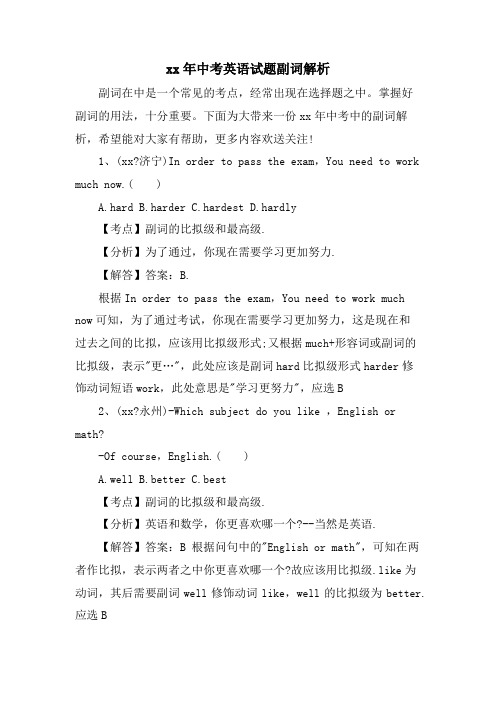
xx年中考英语试题副词解析副词在中是一个常见的考点,经常出现在选择题之中。
掌握好副词的用法,十分重要。
下面为大带来一份xx年中考中的副词解析,希望能对大家有帮助,更多内容欢送关注!1、(xx?济宁)In order to pass the exam,You need to work much now.( )A.hardB.harderC.hardestD.hardly【考点】副词的比拟级和最高级.【分析】为了通过,你现在需要学习更加努力.【解答】答案:B.根据In order to pass the exam,You need to work much now可知,为了通过考试,你现在需要学习更加努力,这是现在和过去之间的比拟,应该用比拟级形式;又根据much+形容词或副词的比拟级,表示"更…",此处应该是副词hard比拟级形式harder修饰动词短语work,此处意思是"学习更努力",应选B2、(xx?永州)-Which subject do you like ,English or math?-Of course,English.( )A.wellB.betterC.best【考点】副词的比拟级和最高级.【分析】英语和数学,你更喜欢哪一个?--当然是英语.【解答】答案:B 根据问句中的"English or math",可知在两者作比拟,表示两者之中你更喜欢哪一个?故应该用比拟级.like为动词,其后需要副词well修饰动词like,well的比拟级为better.应选B3、(xx?咸宁)--Sarah is chosen as the guide for the Fashion Show.--Great! No one speaks English her .( )A.as beautiful asB.as badly asC.worse thanD.better than【考点】副词的比拟级和最高级.【分析】--Sarah中选这次时装秀的向导.--太好了!没有人说英语比她更好.【解答】答案:D.根据答语中的Great!结合语境推测答语的句意是"没有人说英语比她更好."本句中暗含比拟级,即别人和她相比拟,既然认为她胜任向导这份工作,说明她的英语比别人的好,也就是句子中表达的"没有人说英语比她更好."应选D4、(xx?铜仁市)-His handwriting is very careful.-Yeah.With the help of him,his sister writes as as him.( )A.careB.carefulC.more carefullyD.carefully【考点】副词的比拟级和最高级.【分析】--他的书写很认真.--是的,在他的帮助下,他的妹妹写字和他一样认真.【解答】答案:D根据语境结合设空处的短语as …as推测后面一句话的句意是"在他的帮助下,他的妹妹写字和他一样认真.",由于设空处所在的短语是as…as,其用法是:中间用形容词或副词原级,表示"和…一样",再根据设空处单词修饰动词write判断用副词,所以选D5、(xx?鄂州)-Did John get Number 1 in the math exam?--Yes,no one did so as him.( )A.goodB.wellC.betterD.best【考点】副词的比拟级和最高级.【分析】-约翰在数学考试中得到了第一吗?-是的,没有人做得和他一样好.【解答】答案:B.考生需知道:as…as意为"和…一样",表示同级的比拟.使用时要注意第一个as为副词,第二个as为连词,用于肯定句..在陈述句中,so…as 与as…as是一样的,可以互换,但是在否认句中,不可以用not as…as,只能用not so…as.根据语境so…as him可知本空处填副词形容词的原形,这是固定用法,又谓语did是实意动词故必须由副词修饰,所以空缺处应为副词原级well,故答案为B.6、(xx?毕节市)Bob sings in our class.( )A.betterB.bestC.goodD.well【考点】副词的比拟级和最高级.【分析】Bob在我们班里是唱歌最好的.【解答】答案:B.根据比拟范围in our class 结合设空处前面的动词sings,可知这里要用副词的最高级,根据语境推断句意是"Bob在我们班里是唱歌最好的",well 的最高级是best,应选:B.7、(xx?江西)I didn't do very well in thisexam.Unluckily,he did it .( )A.worseB.badlyC.betterD.worst【考点】副词的比拟级和最高级.【分析】我考试没考好,不幸的是,他考的更糟.【解答】答案:A.结合句意可知我没考好,unluckily表示不幸的,也就是他考的比我差,用比拟级,这里用well的比拟级worse来修饰动词did,故答案是A.8、(xx?宁夏)Which do you like ,tea or coffee?( )A.wellB.betterC.bestD.most【考点】副词的比拟级和最高级.【分析】茶和咖啡,你更喜欢哪一种?【解答】答案:根据语境like(喜欢)和 tea or coffee(茶或咖啡)及which(哪一个)可知是两者中更喜欢哪一种,故应用副词well的比拟级better来修饰like,所以答案为B9、(xx?天津)---Could you tell me you'll go to Paris?---Next month.( )A.whyB.whereC.whenD.how【考点】连接副词;宾语从句.【分析】-你能告诉我你什么时候去巴黎吗?-下个月.【解答】答案:C 根据Could you tell me 可知后面跟的是宾语从句,空处缺少引导词;再根据答语Next month可知上句询问的是时间,应该用特殊疑问词when作为引导词,此句是指你能告诉我你什么时候去巴黎吗?符合句意及用法.应选C10、(xx?东营)-Your son used to be a homebody but he now likes outdoor activities.How did you do that?-I tried many ways over and over again.,I madeit.( )A.NextB.ThenC.FinallyD.Suddenly【考点】时间副词.【分析】-你的儿子曾经是个宅男但他现在喜欢户外活动.你是怎么做到的?-我一次又一次的尝试了很多方法,最后,我成功了.【解答】答案:C先分析选项中各个时间副词的含义:next接下来;then然后;finally最后;suddenly突然;根据问句How did you do that?及答语的前后句I tried many ways over and over again (I)made it可知在一次又一次的尝试后,这里应是强调最后终于做到了,改变了儿子.所以此处应是指最后的结果,应用finally.应选C.11、(xx?齐齐哈尔)He solved the problem fromothers.( )A.was differentB.differentlyC.different【考点】方式副词.【分析】他解决这个问题的方式不同于别人.【解答】答案:B;differently副词;different形容词;根据句中信息可知句中所缺的单词修饰动词 solved;故用副词形式;应选B12、(xx?东营)Shanghai Disney Park will be opened on June 16"'.But the tickets for the first day have sold out.( )A.everB.justC.neverD.already【考点】程度副词.【分析】上海迪斯尼将于六月十六日开园,但是第一天的票已经卖光了.【解答】答案:D;A.ever曾经;B.just刚好,恰好;C.never从不,绝不;D.already早已,已经.根据句中信息But the tickets for the first day have sold out可知该句为现在完成时态;根据上句Shanghai Disney Park will be opened on June 16和转折连词but,推测后面的句意:第一天的票已经卖光了.已经:already.应选D.13、xx?绵阳)Driving in the mountains can be very dangerous.You can't be careful.( )A.soB.veryC.muchD.too【考点】程度副词.【分析】在山里开车可能是很危险的.你再小心也不为过.【解答】答案:D 根据"Driving in the mountains can be very dangerous."可知此处说明在山里开车很危险.故后一句应该是提醒你要小心,但是后一句却出现了can't…careful.意义正好相反.故可判断此处是固定短语"can't be too+形容词"表示"再…也不为过".应选D。
- 1、下载文档前请自行甄别文档内容的完整性,平台不提供额外的编辑、内容补充、找答案等附加服务。
- 2、"仅部分预览"的文档,不可在线预览部分如存在完整性等问题,可反馈申请退款(可完整预览的文档不适用该条件!)。
- 3、如文档侵犯您的权益,请联系客服反馈,我们会尽快为您处理(人工客服工作时间:9:00-18:30)。
英语副词考点例析
副词在句子中主要修饰动词、形容词、副词及其他结构以表示程度、方式、时间、地点以及表示说话的态度等。
大多数副词都能用于比较;副词比较级和最高级的规则形式与形容词的相似。
中考英语试题对副词的考查主要是在副词比较级和最高级及常用副词的基本用法等方面。
例1.Can I dance as _______ as you?
A. nice
B. good
C. beautiful
D. well
分析:此题选D。
因为A、B、C都是形容词,不能修饰动词dance。
例2.Which do you like _______, the blue one or the brown one?
A. well
B. better
C. best
D. very much
分析:在两者相比时,要用比较级,动词well的比较级是better,故选B。
例3.The world’s population is growing ______ today.
A. faster and faster
B. fast and fast
C. faster and fast
D. fastest and fastest
分析:英语中表示“越……越……”,常用“比较级+and+比较级”的形式。
故选A。
例4.This morning Li Ming got up _______ earlier than usual.
A. very
B. much
C. too
D. quite
分析:very,too ,quite,都只能修饰形容词和副词原级,不可修饰其比较级。
可修饰比较级的词有:ever, much, a little, a bit, still, a lot, even等,故选B。
例5.You didn't pass the maths exam, and I didn't, _________.
A. also
B. too
C. either
D. neither
分析:neither 意为“两者都不”。
also, too, either三词都可表示“也”。
但also和too常用于肯定句,either用与否定句,故选C。
例6.She's finished drawing the picture, but I haven't _______.
A. too
B. either
C. already
D. yet
分析:根据句意可排除A和B。
already意为“已经”,多用于肯定句;yet意为“仍然”、“还”,多用于否定句和疑问句,故选D
例7.--How_______ do you have an English party?
--I think every week.
A. long
B. soon
C. often
D. many times
分析:how long用于对表示时间持续的状语提问,即对时间“有多长”提问。
how soon用于对表示“要过多久以后”和“要到什么时候”等表示将来意义的时间状语提问。
how often用于对动作发生的频率即多久一次进行提问,how many times是问“多少次”。
故选B。
例8.The wind is blowing ______. The temperature is below zero.
A. hardly
B. loudly
C. widely
D. strongly
分析:此题A、B、C三个选项中的词义分别为“几乎不”,“大声地”和“广泛地”,用在句中都不合适。
表示“风刮得很大”要用strongly修饰,故选D。
